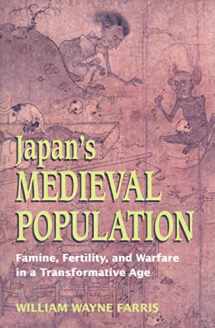
Japan's Medieval Population: Famine, Fertility, and Warfare in a Transformative Age (Choice Outstanding Academic Books)
Book details
Summary
Description
This volume charts a course through never-before-surveyed historical territory: Japan’s medieval population, a topic so challenging that neither Japanese nor foreign scholars have investigated it in a comprehensive way. And yet, demography is an invaluable approach to the past because it provides a way―often the only way―to study the mass of people who did not belong to the political or religious elite. By synthesizing a vast cache of primary and secondary sources, William Wayne Farris constructs an important analysis of Japan’s population from 1150 to 1600 and considers social and economic developments that were life and death issues for ordinary Japanese. Impressive in his grasp of detail and the scope of his inquiry, Farris makes the argument that, although this age initially witnessed the continuation of a centuries-old demographic stasis, a far-reaching transformation began around 1280 and eventually gained momentum until it swept through the Japanese archipelago. Between 1280 and 1600, Japan’s population approximately trebled, growing from 6 million to 17 million. Crucial to the demographic breakthrough was the resolution of two central problems facing both the rulers and the ruled. The first was how to supply a burgeoning population with sufficient food; the second, how to keep the peace.
Japan’s Medieval Population will be required reading for specialists in pre-modern Japanese history, who will appreciate it not only for its thought-provoking arguments, but also for its methodology and use of sources.


We would LOVE it if you could help us and other readers by reviewing the book
Book review




